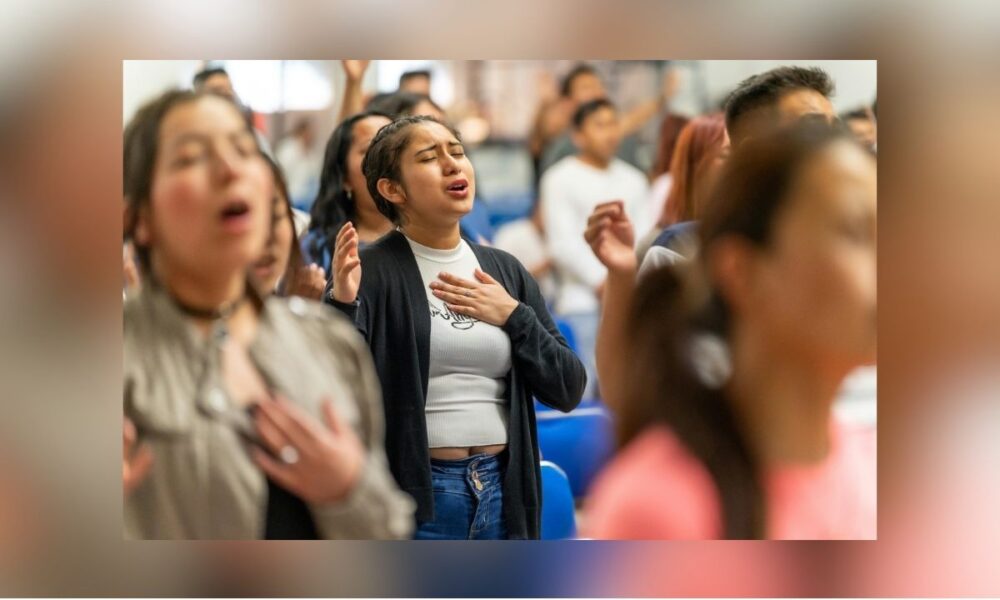A wave of young Americans, particularly college students and millennials, is returning to churches across the country in what some are calling “the Charlie Kirk effect,” following the assassination of the conservative Christian activist on September 10. Many pastors say Kirk’s unapologetic faith and courage in public life have inspired young believers to take their faith more seriously.
The spike in attendance, reported in states like Pennsylvania, Ohio, Michigan, Illinois, and Colorado, comes against a backdrop of declining church participation, with an estimated 15,000 U.S. churches projected to close this year.
Kirk, the 31-year-old co-founder of Turning Point USA and TPUSA Faith, was fatally shot during a Q&A at Utah Valley University by 22-year-old Tyler James Robinson. His death has sparked a surge in worship attendance, especially among young adults who had not attended services in years.
“[There has been] a lot of anecdotal feedback from churches in Pennsylvania, Ohio, Michigan, Illinois, and Douglas County, Colorado, reporting that they’ve seen an increase [in attendance] over the last two Sundays,” said JP De Gance, founder of Communio, a ministry supporting 400 churches nationwide, per the Christian Post. “There’s one church in Michigan that said a number of young adults who were raised in the church [but] who hadn’t been there, and people hadn’t seen them for years, showed back up.”
Matt Zerrusen, co-founder of Newman Ministry, a Catholic nonprofit that operates on 250 college campuses, reported a notable increase in Mass attendance at some schools.
“I have not talked to anyone who has not seen an increase in Mass attendance,” Zerrusen said, according to Catholic News Agency. “Some schools are reporting increases of 15%.”
He noted students seeking spiritual direction: “So many people are asking, ‘What do I do?’ What is evil? How does God allow this?”
Social media reflects the trend, with posts on X, TikTok, and Instagram showing renewed interest in churchgoing.
X user @TONYxTWO, with over half a million followers, shared a TikTok video of a young man saying he had to park “five blocks away from church because everyone wants to come now! Amen. Thank you, Jesus. Thank you, Charlie.”
A Catholic X user, “@TexitDarling,” said her non-churchgoing son requested to attend Mass with her, citing “the Charlie Kirk effect.”
De Gance suggested Kirk’s death prompted introspection among young people.
“And I think that causes a level of introspection,” he told The Christian Post. “I think that causes people to ask, ‘What am I living for right now?’” He urged churches to build on that momentum through fellowship and outreach to sustain engagement.
The broader context of church attendance paints a grim picture. The Pew Research Center reports 29% of Americans are religiously unaffiliated, up from 2007, while only 20% attend church weekly, down from 32% in 2000, per Gallup data.
Millennials, however, show a surprising uptick, with 39% attending weekly, compared to 21% in 2019, according to Barna’s State of the Church report. Non-denominational churches have driven recent growth, adding 6.5 million attendees since 2010, per the US Religion Census.
Meanwhile, mainline Protestant denominations like Methodist, Presbyterian, and Lutheran face steep declines, with the National Council of Churches estimating 100,000 closures in coming years. Catholic churches are also shrinking, with Baltimore’s archdiocese cutting two-thirds of its parishes due to falling attendance and aging infrastructure, per the AP.
“I think the only ones who have shown some dynamism lately on the American Christian landscape are these non-denominational, usually charismatic megachurches,” said Andrew Chesnut of Virginia Commonwealth University, Axios reported.
Kirk’s death has stirred reflection and debate within America’s churches. Evangelical leaders, like those from the Southern Baptist Convention, praised his “courageous defense of the dignity of the unborn,” while others, like Texas pastor Dwight McKissic, criticized the SBC’s endorsement as racially divisive.
“The gap between Black and White evangelicals surrounding this issue is widening,” McKissic posted on social media.
Virginia pastor Howard John-Wesley condemned Kirk’s politics, saying, per USA Today, “There is nowhere in the Bible where we are taught to honor evil, and how you die does not redeem how you lived.”
Despite these divisions, faith leaders across denominations denounced violence.
“Political violence is wrong. It might not be un-American, given our history, but it should be,” wrote Episcopal priest Nathan Empsall.
The Church of Jesus Christ of Latter-day Saints echoed this, stating, “We condemn violence and lawless behavior,” and calling for greater kindness.


